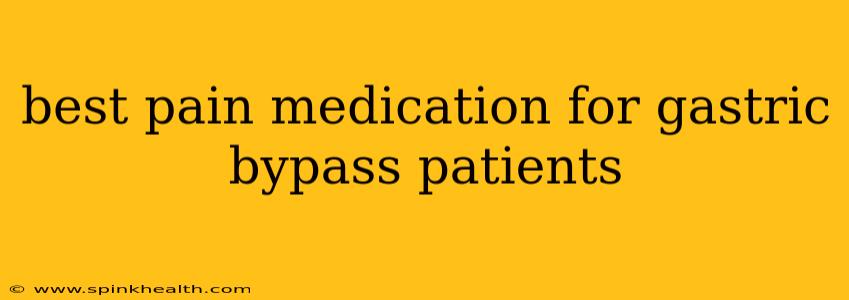The journey after gastric bypass surgery is a remarkable one, filled with both exciting milestones and, inevitably, some discomfort. Managing post-operative pain effectively is crucial for a successful recovery. However, the type of pain medication suitable for gastric bypass patients is different from what might be prescribed after other surgeries. This is because of the unique physiological changes that occur after this procedure, particularly the changes to your digestive system and the potential impact on medication absorption and metabolism. Let's delve into the best approaches to pain management in this context.
What are the common types of pain after gastric bypass?
Post-operative pain after gastric bypass surgery can vary greatly from person to person. Common areas of discomfort include:
- Shoulder pain: This referred pain, often felt in the right shoulder, is a common symptom due to the irritation of the diaphragm from gas buildup during surgery.
- Abdominal pain: This can range from mild cramping to more severe pain, depending on the individual and the extent of the procedure.
- Incisonal pain: This is localized pain around the incision sites.
The intensity and duration of pain vary, and it's crucial to communicate openly with your surgical team about your experience.
What pain medications are typically prescribed after gastric bypass?
Your surgeon will typically prescribe a plan that addresses your individual needs and pain tolerance. Here are some common pain medication approaches:
-
Opioids (Narcotics): These powerful pain relievers are sometimes prescribed for the initial post-operative period when pain is most intense. However, their use is carefully monitored because of their potential for addiction and side effects, especially constipation, which can be particularly problematic after gastric bypass. They are usually prescribed for a short duration.
-
Nonsteroidal Anti-inflammatory Drugs (NSAIDs): These medications, such as ibuprofen or naproxen, are often preferred for longer-term pain management after the initial recovery period. However, NSAIDs can cause gastrointestinal irritation which is a significant concern for gastric bypass patients. Your surgeon may need to carefully weigh the benefits against the risks.
-
Acetaminophen (Tylenol): This over-the-counter pain reliever can be helpful for milder pain and is generally well-tolerated by gastric bypass patients. It's frequently used in conjunction with other medications.
-
Other Medications: In some cases, your surgeon might prescribe other medications, including muscle relaxants to alleviate muscle spasms or anti-nausea medications to help with post-operative nausea.
What are the potential side effects of pain medications after gastric bypass?
It's vital to be aware of the potential side effects of any pain medication, especially given the changes in your digestive system after a gastric bypass. These side effects can include:
- Constipation: A very common side effect, especially with opioid painkillers.
- Nausea and vomiting: Can be worsened by certain medications.
- Gastritis (inflammation of the stomach lining): NSAIDs can increase this risk.
- Increased risk of bleeding: NSAIDs can increase the risk of bleeding, both internally and externally.
- Allergic reactions: Always inform your doctor of any known allergies.
How can I manage pain effectively after gastric bypass without relying heavily on medication?
While medication plays a vital role in pain management, several non-pharmacological approaches can complement your treatment plan:
- Proper rest: Getting adequate rest is essential for healing.
- Ice packs: Applying ice packs to incision sites can reduce swelling and pain.
- Gentle movement: Regular, gentle movement can help prevent stiffness and promote healing. Always follow your surgeon's recommendations.
- Proper nutrition: Following your post-operative diet plan helps with healing and reduces discomfort.
- Deep breathing and relaxation techniques: These can help manage pain and reduce stress.
Is there a specific pain medication that's best for everyone?
No, there isn't one single best pain medication for all gastric bypass patients. The optimal approach depends on various factors, including your individual pain level, tolerance to different medications, and other pre-existing medical conditions. Open communication with your surgical team is crucial to developing a personalized pain management plan that meets your needs. Your surgeon and/or anesthesiologist will consider your medical history, the type of surgery you underwent, and any other relevant factors when making this determination. They will carefully monitor your response to treatment and adjust the medication plan accordingly. Always follow your healthcare professional's instructions closely.
Disclaimer: This information is for educational purposes only and is not a substitute for professional medical advice. Always consult with your surgeon or healthcare provider for personalized guidance on pain management after gastric bypass surgery.

